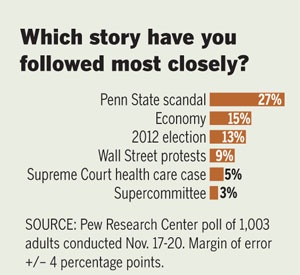CQ WEEKLY
Nov. 27, 2011 – 5:50 p.m.
Political Economy: Can-Kicking 101
By John Cranford, CQ Columnist
In the end, few outside Washington probably cared that the joint deficit reduction committee gave up without a fight. And among those who did care, a number of them from both ends of the political spectrum cheered the demise of an effort they considered ill-conceived at best — and potentially dangerous to the economy at worst.

|
||
|
Oh, the pundits will rail that the Joint Select Committee on Deficit Reduction refused to seize the opportunity to make a significant step toward fiscal responsibility. And the political class will offer its peculiarly twisted critiques designed to win elections — but not arguments.
Liberals will moan that Republican intransigence on taxes prevents Congress from righting a badly listing ship. (Or they will evoke the corollary that GOP lawmakers just kowtow to the rich who pay to keep them in office.)
Conservatives will carp that Democrats can’t bring themselves to be honest about the unsustainable future cost of a bloated federal government that will drag us all into bankruptcy. (Or their corollary: Democrats kowtow to organized labor and a cushy accumulation of government jobs that helps keep them entrenched.)
Meantime, the public will mostly yawn. The American people are bored with hand-wringing over gridlock and are unconvinced that there’s a crisis at hand — particularly when everyone knows a jobless worker and no one has ever met a person hit by a falling Treasury bond.
It’s easy to forget the voters’ culpability in this mess. But the fact is, they have been postponing the inevitable for some time by telling lawmakers not to make tough choices. They want their tax cuts and their Medicare benefits, too. And they elect the politicians who will guarantee both.
What’s perhaps most interesting is the disconnect between what Americans say about politicians — congressional approval ratings are at an all-time low, and President Obama doesn’t fare much better — and what they say about the issues of the day.
Although the public protests Washington’s inability to find a consensus on jobs, the economy, immigration, education, taxes, the deficit or just about any policy matter of consequence, there is plenty of evidence that people really aren’t paying that much attention.
This reality was reinforced last week in a Pew Research Center survey of which items in the news were drawing the most readers, viewers or listeners. The poll, conducted the week before the joint committee’s deadline to produce a $1.2 trillion deficit reduction plan, showed that a majority of Americans — almost three out of five — didn’t follow the news about the joint committee closely or at all.
A bare 3 percent of those surveyed said coverage of the panel’s deliberations in the week before the deadline was the most important story of that period to them. By contrast, 59 percent of those surveyed said they followed closely the sex-abuse scandal at Penn State University, and more than a quarter said that story was the most important. (As a side note, news about the economy was most important to 15 percent of those surveyed.)
This Is Why We Have Elections
Maybe this is as it should be. We have a representative democracy, after all. For all the vaunted “town hall” meetings that politicians use to orchestrate their campaign messages, few places in the country actually operate by plebiscite most of the time.
Political Economy: Can-Kicking 101
People have lives to live. They elect representatives to make decisions. They don’t want to know about how to structure a tax code that is fair or that brings in sufficient revenue. They don’t want to decide to forgo money to help disadvantaged students, or to circumscribe certain medical practices, or to scrap some weapons system. Let others get their hands dirty legislating sausage.
And so the committee tried to do just that and went about its work with a professional and low-key demeanor, which was wise, given the hyperactive politics surrounding the issue. At the same time, though, the panel’s crisis-averse attitude may have been one of the reasons ordinary Americans tuned out.
Or perhaps the public was smart enough to realize that the joint committee — in the end — was haggling over a fairly narrow universe of options for reducing the amount of red ink on the government’s books. No matter what the panel did, the multitrillion-dollar conflict between rising health costs and insufficient revenue would still hang over our heads. Maybe Americans understand that and decided the whole thing wasn’t worth their time.
If there’s a surprise here, it may be found in the “hope springs eternal” attitude of the 12 members of the joint committee during the three months that they talked among themselves, mostly out of earshot. To all appearances, the group seriously tried to reach a deal.
They didn’t, of course, because their constituents ultimately didn’t want one. Inadvertently or otherwise, the public may have gotten its wish.